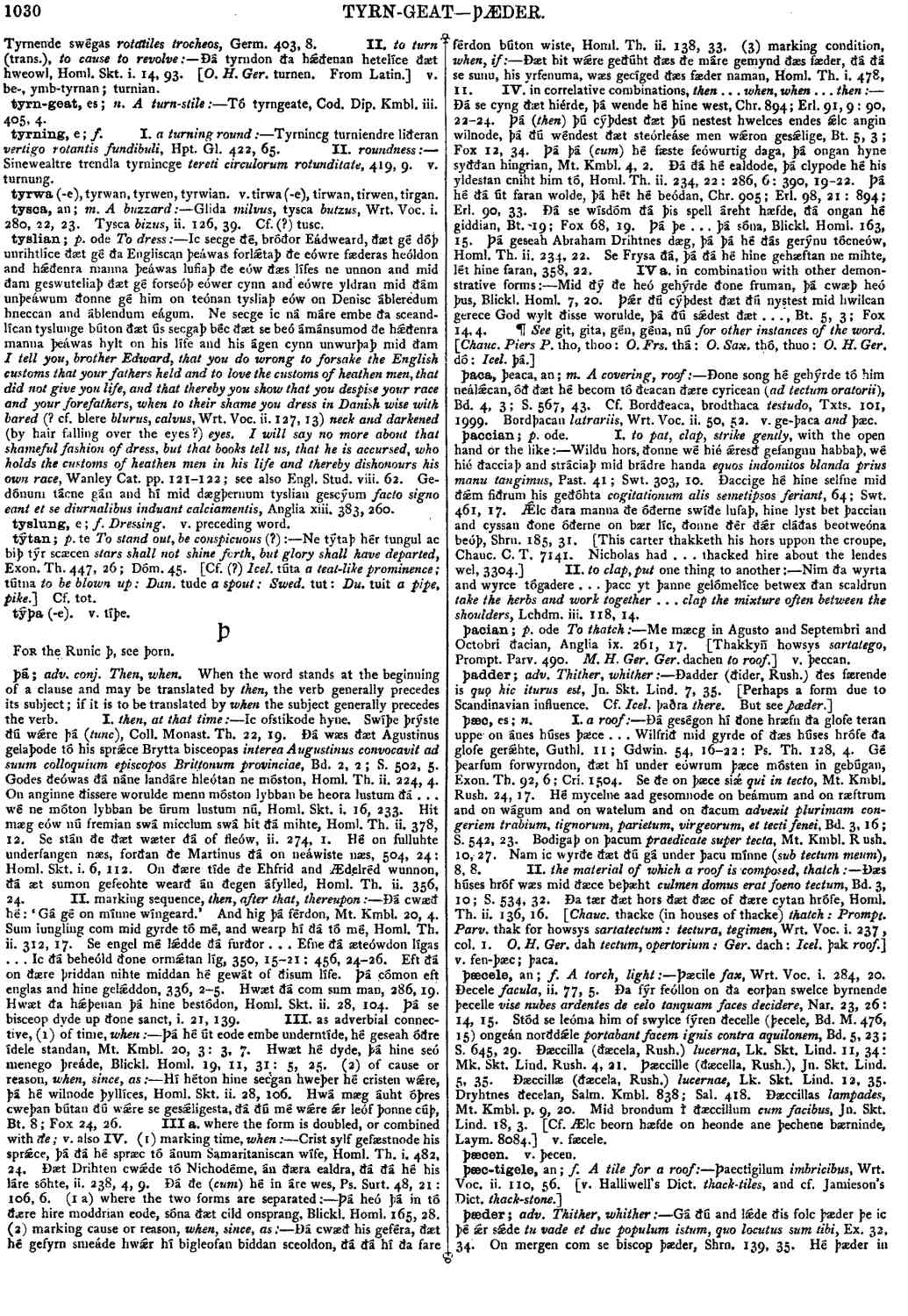þá
- adverb
- conjunction
-
Ic ofstikode hyne. Swíþe þrýste ðú wǽre þá (
tunc
),- Coll. Monast. Th. 22,
19.
-
Ðá wæs ðæt Agustinus gelaþode tó his sprǽce Brytta bisceopas
interea Augustinus convocavit ad suum colloquium episcopos Brittonum provinciae,
- Bd. 2, 2; S. 502, 5.
-
Godes ðeówas ðá náne landáre hleótan ne móston,
- Homl. Th. ii. 224, 4.
-
On anginne ðissere worulde menn móston lybban be heora lustum ðá ... wé ne móton lybban be úrum lustum nú,
- Homl. Skt. i. 16, 233.
-
Hit mæg eów nú fremian swá micclum swá hit ðá mihte,
- Homl. Th. ii. 378, 12.
- Se stán ðe ðæt wæter ðá of fleów, ii. 274, 1.
-
Hé on fulluhte underfangen næs, forðan ðe Martinus ðá on neáwiste næs,
- 504, 24 : Homl. Skt. i. 6, 112.
-
On ðære tíde ðe Ehfrid and Ædelréd wunnon, ðá æt sumon gefeohte wearð án ðegen áfylled,
- Homl. Th. ii. 356, 24.
-
Ðá cwæð hé : 'Gá gé on mínne wíngeard.' And hig þá férdon,
- Mt. Kmbl. 20, 4.
-
Sum iungling com mid gyrde tó mé, and wearp hí ðá tó mé,
- Homl. Th. ii. 312, 17.
-
Se engel mé lǽdde ðá furðor ... Efne ðá æteówdon lígas ... Ic ðá beheóld ðone ormǽtan líg,
- 350, 15-21 : 456, 24-26.
-
Eft ðá on ðære þriddan nihte middan hé gewát of ðisum lífe. Þá cómon eft englas and hine gelǽddon,
- 336, 2-5.
-
Hwæt ðá com sum man,
- 286, 19.
-
Hwæt ða hǽþenan þá hine bestódon,
- Homl. Skt. ii. 28, 104.
- Þá se bisceop dyde up ðone sanct, i. 21, 139.
-
Þá hé út eode embe underntíde, hé geseah óðre ídele standan,
- Mt. Kmbl. 20, 3 : 3, 7.
-
Hwæt hé dyde, þá hine seó menego þreáde,
- Blickl. Homl. 19, 11, 31 : 5, 25.
-
Hí héton hine secgan hweþer hé cristen wǽre, þá hé wilnode þyllíces,
- Homl. Skt. ii. 28, 106.
-
Hwá mæg áuht óþres cweþan bútan ðú wǽre se gesǽligesta, ðá ðú mé wǽre ǽr leóf þonne cúþ,
- Bt. 8; Fox 24, 26.
- III a. where the form iss
-
Crist sylf gefæstnode his sprǽce, þá ðá hé spræc tó ánum Samaritaniscan wífe,
- Homl. Th. i. 482, 24.
-
Ðæt Drihten cwǽde tó Nichodéme, án ðæra ealdra, ðá ðá hé his láre sóhte, ii. 238,
- 4, 9.
-
Ðá ðe (
cum
) hé in áre wes,- Ps. Surt.
48, 21 : 106, 6. (1 a)
-
Ðá cwæð his geféra, ðæt hé gefyrn smeáde hwǽr hí bigleofan biddan sceoldon, ðá ðá hí ða fare férdon búton wiste,
- Homl. Th. ii. 138, 33.
-
Ðæt hit wǽre geðúht ðæs ðe máre gemynd ðæs fæder, ðá ðá se sunu, his yrfenuma, wæs gecíged ðæs fæder naman,
- Homl. Th. i. 478, l l.
-
Ðá se cyng ðæt hiérde, þá wende hé hine west,
- Chr. 894; Erl. 91, 9 : 90, 22-24.
-
Þá (
then
) þú cýþdest ðæt þú neatest hwelces endes ǽlc angin wilnode, þá ðú wéndest ðæt steórleáse men wǽron gesǽlige,- Bt. 5, 3; Fox 12, 34.
-
Þá þá (
cum
) hé fæste feówurtig daga, þá ongan hyne syððan hingrian,- Mt. Kmbl. 4, 2.
-
Ðá ðá hé ealdode, þá clypode hé his yldestan cniht him tó,
- Homl. Th. ii. 234, 22 : 286, 6 : 390, 19-22.
-
Þá hé ðá út faran wolde, þá hét hé beódan,
- Chr. 905; Erl. 98, 21 : 894; Erl. 90, 33.
-
Ðá se wísdóm ðá þis spell áreht hæfde, ðá ongan hé giddian,
- Bt. 19; Fox 68, 19.
-
Þá þe ... þá sóna,
- Blickl. Homl. 163, 15.
-
Þá geseah Abraham Drihtnes dæg, þá þá hé ðás gerýnu tócneów,
- Homl. Th. ii. 234, 22.
-
Se Frysa ðá, þá ðá hé hine gehæftan ne mihte, lét hine faran,
- 358, 22. IV a. in
-
Þǽr ðú cýþdest ðæt ðú nystest mid hwilcan gerece God wylt ðisse worulde, þá ðú sǽdest ðæt . . . ,
- Bt. 5, 3; Fox 14, 4.
- ¶ See git, gita, gén, géna, nú for other instances of the word.
Bosworth, Joseph. “þá.” In An Anglo-Saxon Dictionary Online, edited by Thomas Northcote Toller, Christ Sean, and Ondřej Tichy. Prague: Faculty of Arts, Charles University, 2014. https://bosworthtoller.com/31438.
Checked: 0